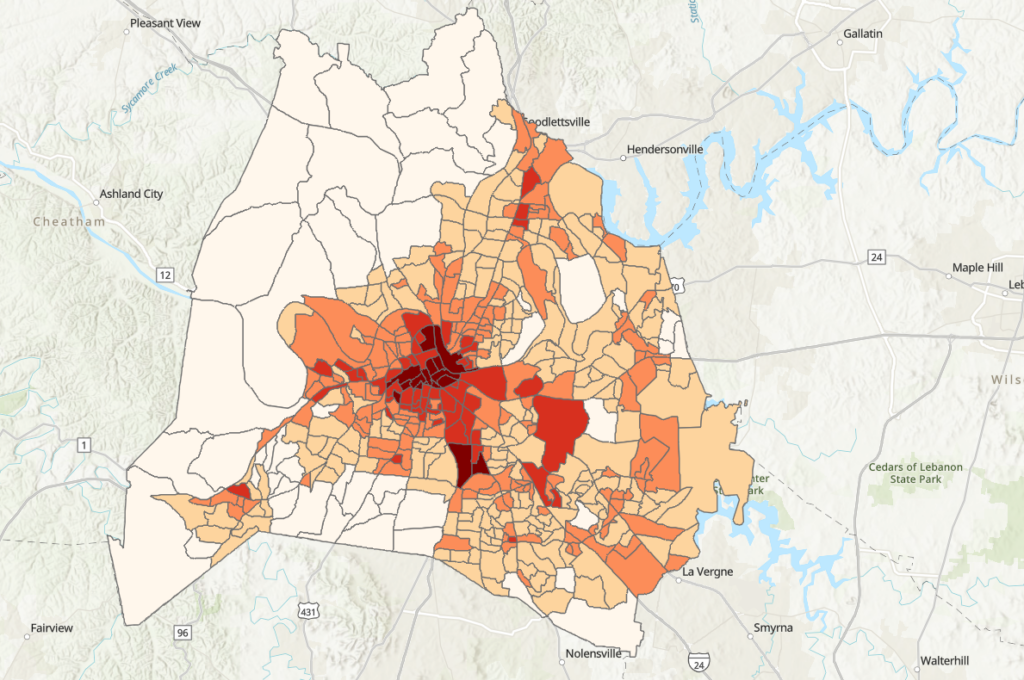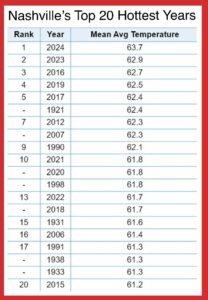
Nashville experienced its hottest year on record in 2024, breaking the record set in 2023.
The past 10 years have been in Nashville’s top 20 warmest years. Last year, the city set a new average annual temperature high of 63.7 degrees.
 Caroline Eggers WPLN News
Caroline Eggers WPLN NewsThe past 10 years rank in Nashville’s top 20 warmest years, according to National Weather Service data. This chart reflects annual averages calculated by months. When calculated by days, the past 10 years fall in the city’s top 18 warmest years.
2024 was also Earth’s hottest year on record, thanks mostly to climate change and El Niño. Greenhouse gas emissions caused primarily by the burning of fossil fuels are heating up cities across the planet. Nashville has been getting warmer and wetter, on average, with more heatwaves and cycles of drought followed by heavy rainfall.
But 2024 wasn’t just about heat. Here are some other weather standouts for the year.
Drought followed by Arctic blast in January
Nashville started the year in a serious drought, and nearly 50% of Tennessee was in “extreme” drought.
Two weeks later, nearly eight inches of snow dumped on the city during an Arctic blast. The Tennessee Valley Authority avoided a blackout, partially thanks to people voluntarily lowering their thermostats. (TVA cut power the previous winter due to fossil fuel plant failures and gas shortages.)
Nashville dropped to -1 degrees during the Arctic storm, then jumped back up to over 60 degrees a week later. January landed in the bottom third of Nashville’s coldest months, but February ended as the city’s 7th warmest.
Warm, early spring
Nashville had its second-hottest spring on record, with the highest warming departures at night. The city had its warmest-ever average low temperature for the season.
Spring also arrived early, which can throw off ecological patterns for pollinators.
In May, a notable standout was the northern lights being visible in the U.S. South, during the first “severe geomagnetic storm watch” issued by the National Oceanic and Atmospheric Administration since 2005.
In Middle Tennessee, some areas experienced tornadoes and record-breaking rainfall. All eight of Tennessee’s tornadoes last year occurred in Middle Tennessee, according to the NWS tornado database.
Hot, dry summer with 100-degree days
Tennessee dried up this summer, making it the third consecutive summer with drought.
The state has experienced significant droughts for the past three years. Prior to this pattern of drought, Tennessee recorded three of the five wettest years since 1895 in the years 2018, 2019 and 2020.
Nashville hit at least 100 degrees three days in a row in August. The city also hit 100 degrees once in July. (The city hit 100 twice in 2023 and once in 2022, which was the first time since 2012.)
In 2024, the city hit at least 95 degrees across 36 days — the seventh-highest amount in any year. The record was 50 days in 1954, which also holds the record for the most days above 90.
Hurricane Helene slams East Tennessee
In September, East Tennessee was hit by two consecutive storms. Floodwaters from western North Carolina flowed into Tennessee’s valleys. The storms set new river and dam records and triggered landslides.
The Tennessee Valley Authority issued a “red alert” at one of its dams due to fears of “imminent failure.”
More: Tennessee’s ‘high hazard’ dams lack current emergency plans, flood mapping | WPLN News
Nashville has third-warmest fall
The city experienced its third-warmest fall on record. Like spring, the warming was most evident in the low temperatures.
One day after the November election, the city hit 80 degrees, setting a new daily extreme.
Nashville did not experience its first freeze of the year until Nov. 29, the latest on record.
The city ended the year with a normal amount of rain. The eastern half of Tennessee, however, was once again in drought as of Dec. 31.
Tennessee legislation related to weather in 2024
The Tennessee General Assembly had two major bills related to weather this year.
Legislators once again proposed mapping landslides without success.
And, with significant controversy, legislators with ties to development proposed axing the state’s protections for wetlands to benefit developers. The bill was defeated, but another version is expected this year.
More: Wetlands have some protections in Tennessee. The state legislature might remove them. | WPLN News
Gov. Bill Lee declined to fund a statewide network of weather stations in this year’s state budget back in February. The Tennessee Department of Military had requested funding for both a mesonet and other flood-preparedness tech.
More: Three years after Waverly, the state hasn’t funded critical flood preparedness systems | WPLN News
The state legislature has not funded much explicitly climate-focused legislation in recent years — and has even passed new laws to block climate action and protect the fossil fuel industry.
Last year, the state released its first-ever climate action plan. A comprehensive plan from the Tennessee Department of Environment and Conservation is due this summer.



